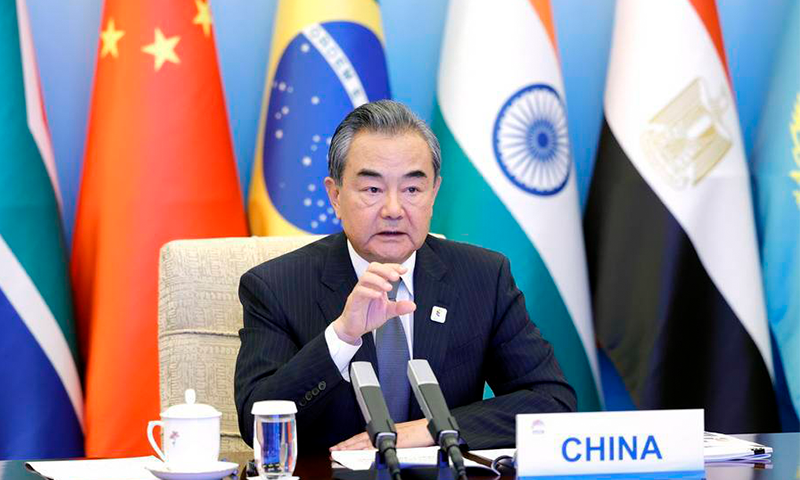
Wang Yi chairs dialogue of foreign ministers between BRICS and emerging markets and developing countries on May 19, 2022. Photo: Courtesy of Ministry of Foreign Affairs
A day before US President Joe Biden's Asia trip, a 25-pronged joint statement was finalized at the BRICS foreign ministers' meeting Thursday night Beijing time, which includes consensus on increasing the role of emerging economies in inclusive global governance, support for Russia-Ukraine negotiations, counterterrorism and arms control, as well as the possible BRICS expansion.
Chinese State Councilor and Foreign Minister Wang Yi summarized the BRICS' common position at the "cordial and pragmatic" meeting into four aspects: including upholding the multilateralism, promoting common development, strengthening solidarity and cooperation. Chinese experts viewed the meeting and consensus it reached as the voice of a wide range of developing countries, offsetting the negative impact of some countries' efforts to reverse globalization and form political blocs.
Wang chaired the meeting on Thursday via video link. South African Minister of International Relations and Cooperation Naledi Pandor, Brazilian Foreign Minister Carlos Franca, Russian Foreign Minister Sergey Lavrov, and Indian External Affairs Minister Subrahmanyam Jaishankar attended the meeting.
Based on the joint statement, ministers reaffirmed their commitment to making global governance more representative and democratic, and to increase the participation of emerging markets and developing countries in global decision-making.
China and Russia reaffirmed the importance they attach to the status and role of Brazil, India and South Africa in international affairs and support their aspiration to play a greater role in the United Nations.
Unlike in the past when BRICS meetings placed more emphasis on economic development and cooperation, ministers have confirmed consensus over multiple issues related to security. For instance, they expressed support for Russia-Ukraine negotiations, stressed the UN should continue to play a core coordinating role in combating terrorism in all its forms, calling for the early adoption of the Comprehensive Convention on Terrorism.
Ministers also called for strengthening international arms control, disarmament and non-proliferation systems, especially the need to observe and strengthen the Biological Weapon Convention, including through the adoption of a legally binding protocol that involves an efficient verification mechanism.
Voices from developing countries are often dismissed by the West, which feels it represents the whole international community, Wang Yiwei, director of the Institute of International Affairs at the Renmin University of China, told the Global Times on Sunday.
He noted that after the Russia-Ukraine conflict, the world is facing the danger of further confrontation, division and even nuclear war. BRICS shares such security concerns as representatives of developing countries. Russia, a BRICS member, is subject to economic sanctions imposed by the US and the West.
The United States does not speak for the majority of the world, but BRICS speaks for the large group of developing countries and emerging economies, and none of them has imposed sanctions on Russia, said Wang "The US cannot rely on the threat of sanctions to force other countries to help it achieve its goals."
The US wants to isolate Russia and spark a cold warlike confrontation. At the same time, Washington reorganizes its alliance system in Asia by visiting Japan and South Korea, excluding China and BRICS countries from the high-tech industrial chain, pushing the world to deviate from the process of globalization.
China put forward global security initiatives in April this year. "BRICS is not only a platform for advocating, but also for implementing. It is quite possible that BRICS countries will jointly provide some security-related public goods in the future," Wang said.
"The BRICS mechanism is bearing more comprehensive functions and assuming more responsibilities, and injects more stability and certainty to counter the US-led turbulence," a Beijing-based international affairs expert told the Global Times on the condition of anonymity.
The BRICS foreign ministers' meeting was held against the backdrop of Biden's Asia roadshow which aims to divide the region. "Biden's visit is in contrast to BRICS, an epochal mechanism for promoting sustainable world development, with the US' plan for geopolitical confrontation, thus giving the world, especially developing countries, a clearer understanding," the expert said.
BRICS is the most emblematic mechanism for representing the interests and propositions of emerging economies and developing countries, which have a strong desire to ensure that their interests are not infringed in times of turbulence and transformation, the expert said.
BRICS aims to promote sound, positive and security concepts through mutual benefits and inclusiveness. It is not like the US to undermine the economic and sustainable development of the world's emerging economies by creating bloc-political confrontation in a hegemonic posture.
The BRICS mechanism provides developing countries with a proper alternative to the crisis-creating, disruptive, anti-globalization agenda of the United States, and its expansion is inevitable, the expert said.




